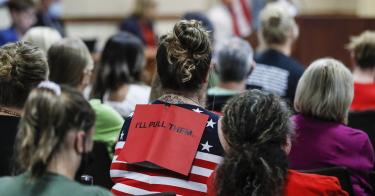Democrats are still trying to make sense of Virginia’s governor’s race, which turned out to be an informal referendum on parental rights in education. According to a Washington Post poll, voters ranked education the second most important issue, and a whopping 77% of governor-elect Glenn Youngkin’s voters agreed with the statement that parents should have “a lot” of say in what their child’s school teaches.
The vote was a clear rebuff to Democrat Terry McAuliffe’s position that parents shouldn’t be telling schools what they should teach. Virginia’s parents showed America that parents can win back control over their children’s education when they speak up and show up.
It shouldn’t be a surprise that parents want government officials to support them rather than exclude them as they educate their children. But not everyone agrees.
Take an op-ed by Jack Schneider and Jennifer Berkshire in the Washington Post arguing that parents don’t have the right to shape their children’s school curriculum. The authors attempt to make a legal argument against parents having the right to direct their children’s education, citing the 1922 U.S. Supreme Court case Pierce v. Society of Sisters. Ironically, they left out a critical line from the ruling, which held: “The child is not the mere creature of the State; those who nurture him and direct his destiny have the right, coupled with the high duty, to recognize and prepare him for additional obligations.”
“Those who nurture him” are, of course, the child’s parents. Parents’ duties and rights go hand in hand. To carry out their duty, parents must know what is in their children’s curriculum. Yet, some want to keep parents locked out of what’s happening in their children’s education. In Loudoun County, Virginia, which in many ways has become the epicenter for parental rights, the district revealed it would be forcing parents to sign what effectively equates to a non-disclosure agreement (NDA) if they want a peek at one part of the district’s critical race theory curriculum.
And as in many places, the problems in Loudoun County go far beyond the curriculum. As parents learned, to their horror, two high school girls were sexually assaulted by a male classmate—with one of the assaults happening in the girls’ bathroom.
Although he was aware of the location of the assault, Superintendent Scott Ziegler denied that any assaults had occurred in bathrooms when questioned by parents concerned that a policy that would allow boys who claim a female gender identity to use girls’ bathrooms could result in similar threats to girls’ privacy and safety. Schools can teach students to respect one another’s beliefs without endangering their safety and compromising their privacy. A policy that allows both sexes to use the same bathrooms, locker rooms, and showers create obvious problems. These problems cannot be overlooked to assuage the discomfort that some students feel with their own bodies.
But rather than listen, the school board overrode parents’ concerns and adopted the radical policy. Mr. Youngkin made accountability for the Loudoun County School board a centerpiece of his campaign, and parents noticed. The incidents in Loudoun County should show all school boards and state and federal authorities that commonsense policies respecting the differences between girls and boys are necessary and appropriate.
Parents also recognize who is and isn’t on their side in Washington. Attorney General Merrick Garland’s misguided and unsubstantiated memo instructing the FBI to investigate parents who protest radical school policies revealed where the Biden administration’s loyalties lie. Mr. Garland has yet to rescind the letter even though the National School Board Association (NSBA) apologized for its galling comparison of parents to “domestic terrorists” in a letter to President Joe Biden.
Some state lawmakers are proactively protecting children and parental rights. They have signed the Promise to America’s Children and introduced legislation to protect children’s minds, bodies, and family relationships from destroying gender ideology.
And this past July, Florida’s lawmakers joined several other states that recognize parents’ fundamental right to direct the upbringing and education of their children. The state’s parents’ bill of rights requires a school district to promote parental involvement in the public school system by providing access to the child’s studies and instructional materials while recognizing a parent’s right to withdraw the child from certain objectionable topics. This bill of rights should be posted on the website of every school district in America.
Parents across the country want school boards to remove politics from the classroom and get back to academics. Schools should be a safe and healthy place for every child to learn. The results of Virginia’s election show that parents can make it so.
This piece originally appeared in The Washington Times



